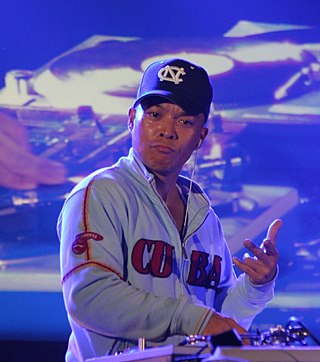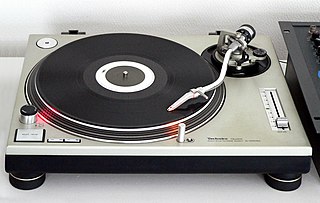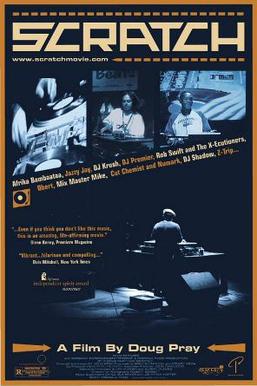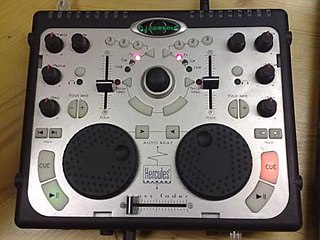
A disc jockey, more commonly abbreviated as DJ, is a person who plays recorded music for an audience. Types of DJs include radio DJs, club DJs, mobile DJs, and turntablists. Originally, the "disc" in "disc jockey" referred to shellac and later vinyl records, but nowadays DJ is used as an all-encompassing term to also describe persons who mix music from other recording media such as cassettes, CDs or digital audio files on a CDJ, controller, or even a laptop. DJs may adopt the title "DJ" in front of their real names, adopted pseudonyms, or stage names.

Scratching, sometimes referred to as scrubbing, is a DJ and turntablist technique of moving a vinyl record back and forth on a turntable to produce percussive or rhythmic sounds. A crossfader on a DJ mixer may be used to fade between two records simultaneously.

Turntablism is the art of manipulating sounds and creating new music, sound effects, mixes and other creative sounds and beats, typically by using two or more turntables and a cross fader-equipped DJ mixer. The mixer is plugged into a PA system and/or broadcasting equipment so that a wider audience can hear the turntablist's music. Turntablists typically manipulate records on a turntable by moving the record with their hand to cue the stylus to exact points on a record, and by touching or moving the platter or record to stop, slow down, speed up or, spin the record backwards, or moving the turntable platter back and forth, all while using a DJ mixer's crossfader control and the mixer's gain and equalization controls to adjust the sound and level of each turntable. Turntablists typically use two or more turntables and headphones to cue up desired start points on different records.

Technics SL-1200 is a series of direct-drive turntables originally manufactured from October 1972 until 2010, and resumed in 2016, by Matsushita Electric under the brand name of Technics. S means "Stereo", L means "Player". Originally released as a high fidelity consumer record player, it quickly became adopted among radio and disco club disc jockeys, thanks to the direct drive, high torque motor design, making it initially suitable for pushbutton cueing and starting of tracks on radio and in dance clubs. It is still extremely popular with audiophiles.

Scratch is a 2001 documentary film, directed and edited by Doug Pray. The film explores the world of the hip-hop DJ from the birth of hip-hop when pioneering DJs began extending breaks on records, to the invention of scratching and beat juggling, to the more recent explosion of turntablism. Throughout the documentary, many artists explain how they were introduced to hip-hop while providing stories of their personal experiences.
Traktor is DJ software developed by Native Instruments. It is also used as a sub-brand for Native Instruments' associated DJ hardware products.
Final Scratch is a DJ tool created by the Dutch company N2IT with input from Richie Hawtin and John Acquaviva that allows manipulation and playback of digital audio sources using traditional vinyl and turntables. It seeks to cross the divide between the versatility of digital audio and the tactile control of vinyl turntablism.

A DJ mixer is a type of audio mixing console used by disc jockeys (DJs) to control and manipulate multiple audio signals. Some DJs use the mixer to make seamless transitions from one song to another when they are playing records at a dance club. Hip hop DJs and turntablists use the DJ mixer to play record players like a musical instrument and create new sounds. DJs in the disco, house music, electronic dance music and other dance-oriented genres use the mixer to make smooth transitions between different sound recordings as they are playing. The sources are typically record turntables, compact cassettes, CDJs, or DJ software on a laptop. DJ mixers allow the DJ to use headphones to preview the next song before playing it to the audience. Most low- to mid-priced DJ mixers can only accommodate two turntables or CD players, but some mixers can accommodate up to four turntables or CD players. DJs and turntablists in hip hop music and nu metal use DJ mixers to create beats, loops and so-called scratching sound effects.

Vestax Corporation was a Japanese musical instrument, turntable and audio equipment firm founded by Hidesato Shiino in 1977. The company started by designing and manufacturing electronic guitars. In the 1980s, Vestax produced multitrack recorders and later moved to making DJ mixers, professional turntables, CD players and signal processors. Debt troubles led to the company's bankruptcy at the end of 2014.

Vinyl emulation allows a user to physically manipulate the playback of digital audio files on a computer using the turntables as an interface, thus preserving the hands-on control and feel of DJing with vinyl. This has the added advantage of using turntables to play back audio recordings not available in phonograph form. This method allows DJs to scratch, beatmatch, and perform other turntablism that would be impossible with a conventional keyboard-and-mouse computer interface or less tactile control devices.

A CDJ is a specialized digital music player for DJing. Originally designed to play music from compact discs, many CDJs can play digital music files stored on USB flash drives or SD cards. In typical use, at least two CDJs are plugged into a DJ mixer. CDJs have jog wheels and pitch faders that allow manipulation of the digital music similar to a vinyl record on a DJ turntable. Many have additional features such as loops and beat analysis that are not present on turntables. Additionally, some can function as DJ controllers to control the playback of digital files in DJ software running on a laptop instead of playing the files on the CDJ.

Mixxx is free and open-source software for DJing. It is cross-platform and supports most common music file formats. Mixxx can be controlled with MIDI and HID controllers and timecode vinyl records in addition to computer keyboards and mice.
DJ Woody is a prolific DJ and turntablist born in Burnley, Lancashire UK.

Ortofon is a Danish manufacturer of electronic audio equipment. It is the world's largest producer of magnetic cartridges for phonograph turntables, with 500,000 cartridges sold annually.

DJ controllers are devices used to help DJs mix music with DJ software using knobs, encoders, jog wheels, faders, backlit buttons, touch strips, and other components.

Controllerism is the art and practice of using musical software controllers, e.g. MIDI, Open Sound Control (OSC), joystick, etc., to build upon, mix, scratch, remix, effect, modify, or otherwise create music, usually by a Digital DJ or Live PA performer, often called a controllerist. Controllerism is also a nod to traditional musicianship and instrumental-ism paired with modern computer sequencing software such as Ableton Live and Native Instruments Traktor. However a working knowledge of scales and chords is not necessarily required as the performers typically focus their efforts more on sequencing events, software effect and instrument manipulations using buttons, knobs, faders, keys, foot switches and pedals than on instrumental notes played in real time. With recent developments in music technology, particularly in software instruments, a USB MIDI controller enables musicians almost unlimited possibilities to control a wide variety of sound types.

Cross/CrossDJ is a digital vinyl and DJ mixing software developed by the French company Mixvibes. This software provides DJs with a digital platform with which they can mix and perform their music. Since its release in 2008, it has become Mixvibes primary focus.
inMusic is an American enterprise that is the parent company for a family of brands of varying audio products used in the DJ, music production, live sound, musical instrument, pro audio, software, stage lighting, and consumer electronics industries. The company's corporate headquarters are located in Cumberland, Rhode Island, with additional offices in Canada, Germany, United Kingdom, Taiwan, Japan, and Bulgaria.
Pioneer DJ is a brand of DJ products, including media players and DJ software controllers, turntables, DJ mixers, headphones, effects units, and loudspeakers. Originally part of Pioneer Corporation, the company became independent in 2014 as Pioneer DJ Corporation, and has produced numerous industry-standard DJ products. The company's market share of the DJ market is estimated at 60%. Pioneer DJ Corporation changed its company name to AlphaTheta Corporation from January 1, 2020. Their brands and brand names, including Pioneer DJ, were not affected by this change, until January 2024, when it was announced that new products would be released under the AlphaTheta brand.

DJing is the act of playing existing recorded music for a live audience.
















